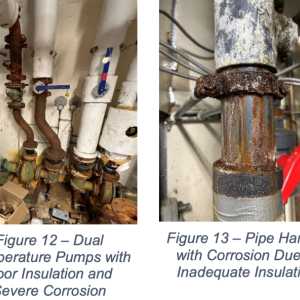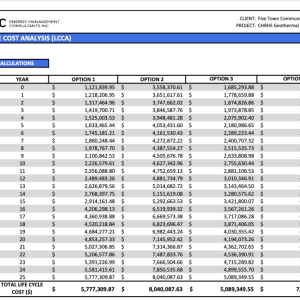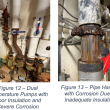Five Town CSD to hold public hearing on $7.3 million borrowing package
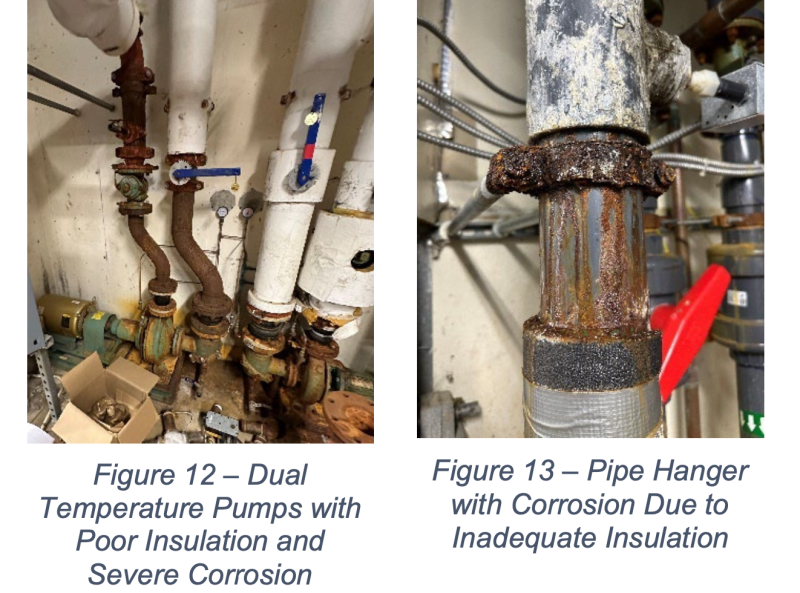 Corroded pipes that lead to the five geothermal wells beneath Camden Hills Regional High School, on Route 90 in Rockport. (Photo courtesy EMC report submitted to the Five Town CSD)
Corroded pipes that lead to the five geothermal wells beneath Camden Hills Regional High School, on Route 90 in Rockport. (Photo courtesy EMC report submitted to the Five Town CSD)
 Maine Bond Bank Spring 2025 schedule (Image originates at the Maine Bond Bank. mmbb.com)
Maine Bond Bank Spring 2025 schedule (Image originates at the Maine Bond Bank. mmbb.com)
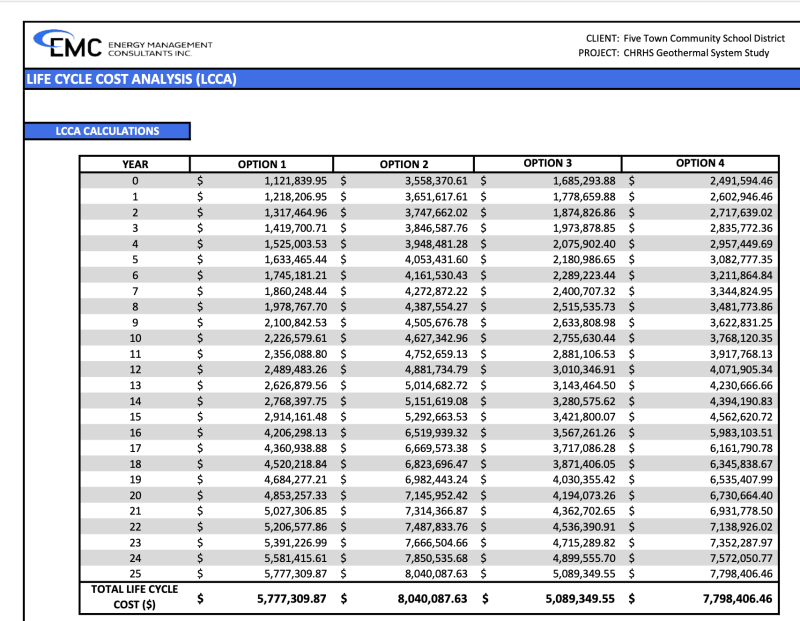
 Artificial turf field proposal at CHRHS
Artificial turf field proposal at CHRHS
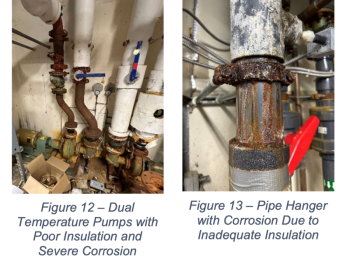 Corroded pipes that lead to the five geothermal wells beneath Camden Hills Regional High School, on Route 90 in Rockport. (Photo courtesy EMC report submitted to the Five Town CSD)
Corroded pipes that lead to the five geothermal wells beneath Camden Hills Regional High School, on Route 90 in Rockport. (Photo courtesy EMC report submitted to the Five Town CSD)
 Maine Bond Bank Spring 2025 schedule (Image originates at the Maine Bond Bank. mmbb.com)
Maine Bond Bank Spring 2025 schedule (Image originates at the Maine Bond Bank. mmbb.com)
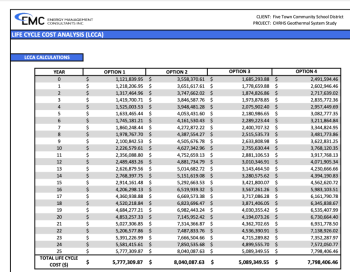
 Artificial turf field proposal at CHRHS
Artificial turf field proposal at CHRHS
CAMDEN — On Thursday, Jan. 2, the Five Town CSD will hold a public hearing on the proposed $7.3 million bond that is to appear before voters in Appleton, Camden, Hope, Lincolnville and Rockport Jan. 14, at the polls in each town. The bond proposal bundles four separate projects at Camden Hills Regional High School: Maintenance and replacement of the HVAC system; window and siding replacements; installation of a new synthetic turf field; and seating and code upgrades in the Strom Theater.
The hearing will begin at 6 p.m. in the Rose Hall Board Room, on Knowlton Street in Camden. The discussion of the referendum is the only item on the agenda.
The CSD is holding the vote in mid-January because it hopes to meet the deadline of the May bond sale at the Maine Municipal Bond Bank. The Maine Bond Bank, created in 1971 by the Maine State Legislature, provides Maine municipalities, school systems, water and sewer districts, and other governmental entities access to low-cost capital funds through the sale of tax-exempt bonds. The Maine Bond Bank is rated AA+/stable, Aa1 stable by S&P Global (Standard and Poor) and Moody's, respectively.
"Traditionally twice a year, in the spring and fall, the Bond Bank will consolidate eligible applicants and engage in a bond sale," the Maine Bond Bank said. "From application to receipt of funds the bond issuance process usually lasts four months."
The Jan. 14 referendum question asks voters:
Article 1. Do you favor authorizing the School Board of Five Town Community School District (the “District”) to issue bonds or notes in the name of the District for minor capital project purposes in an amount not to exceed $7,300,000 to construct and equip the following projects at Camden Hills Regional High School:
1. Replacing the Don Palmer Field with artificial turf;
2. HVAC system improvements to replace failed geothermal system;
3. Replacement siding and windows; and
4. Strom Auditorium repairs and upgrades.
Taxpayers in the five towns will begin repaying the bond in 2026, if the package is approved, the CSD said. The initial 2026 bond payment will add an additional 4.5 – 6% (depending how the repayment is structured) to the 2026 Five Town CSD school budget. That budget runs on a July-June fiscal year.
The CSD has not prepared its 2026 budget, which is to be presented in February to the CSD School Board, but the superintendent's office anticipates that budget, with the initial $7.3 million bond payment incorporated, to increase by approximately 10 percent.
"School administrators will scrutinize every line in the budget to bring it in as low as possible while maintaining a quality education," the CSD said, in a prepared statement about the bond proposal. "The reality is that we need to maintain our facilities and the cost of doing so has risen precipitously in the past five years. Not completing these projects at this time could result in much greater costs down the line."
HVAC Repair and Replacement, $2.5 million
According to the CSD, the geothermal system at the high school, built in 1999, provides 10% of the heating and 90% of the cooling capacity at the school, but it has failed. The No. 2 oil burners are also at the end of their lifespan.
"Despite the potential benefits of such a system, Camden Hills Regional High School has been experiencing significant challenges with its geothermal system, particularly concerning the open wells, corrosion of the pipes and equipment, sequence of operations, and overall system capacity and reliability," wrote Energy Management Consultants, in a 179-page consultant report. That report contains analysis of the existing HVAC system, as well as recommendations, and specification sheets for proposed new equipment.
At the Nov. 6 CSD School Board meeting, Energy Management Consultants outlined problems with the geothermal system, saying issues of the geothermal system include:
1) overflowing wells, corrosion;
2) a collapsed well, #2;
3) inadequate piping insulation;
4) failing valves;
5) clogged filters; and
6) an inadequate system capacity.
Also, the Hatchery Commons and the gym lack sufficient cooling, the report said.
The vertical geothermal well piping originally had been galvanized piping, EMC said. That material was unsuitable for well water conditions, including the elevated salt levels, the report said.
The elevated salt levels have been informally attributed to the former Maine DOT salt and sand depot on Route 90, which is on a state-owned parcel adjacent to the high school property.
The CSD and EMC contacted three well companies to snake cameras through the underground system to help determine the extent of deterioration.
"These conversations provided valuable insights into the history of well piping and pump replacements," the EMC report said. "Additionally, there was concern raised about a former salt depot located near the school’s property, which may be leaching residual salt into the groundwater and contributing to the corrosion observed in the system.
"Despite multiple requests, none of the companies were able to perform the camera inspection due to various constraints, such as equipment being under repair or concerns about the camera becoming lodged in the narrow access spaces between the pipes. Instead, the companies recommended pulling the well piping and pumps to allow for inspection access, but this procedure was beyond the scope of this study and was not pursued.
"It was also noted by the school’s facility team that Well 2 has collapsed twice and has been abandoned at this time. The company that services the wells did not provide any further information about this collapse and attributed it to the reason that some of the vertical well piping was replaced over the years. With Well 2 non-operational, this limits the maximum capacity of the GSHP’s to approximately 2/3 of it’s total capacity."
Additionally, while the galvanized piping had been replaced with plastic piping, the well casings are still original iron piping, the report said.
In October, EMC produced four repair and upgrade options, each with life cycle cost analyses (LCCA). The LCCA evaluated initial investment and long-term costs, including energy consumption, maintenance, and replacement expenses over a 25-year period. The goal of the LCCA is to determine the most cost-effective and sustainable solution for the school’s heating and cooling needs, the report said.
Options, with their initial costs, included:
1) fix and improve the existing open loop geothermal well system ($1.8 million) ;
2) convert to a closed loop system ($3.6 million) :
3) convert to condensing boilers and an air-cooled chiller ($1.7 million), or
4) convert to air source heat pumps ($2.5 million).
EMC has recommended Option 3, which entails installing two new 2000 mbh (unit of measurement for heat) propane condensing boilers and an air-cooled chiller system. Option 3 includes filling in the geothermal wells, and it removes the two No. 2 oil burners currently in use.
"Options 1 and 2, which modify or replace the existing geothermal system, provide significant improvements in performance and reliability, but their high initial costs and life cycle expenses may not justify the investment unless long-term energy savings are a priority," the EMC report said. "Option 3, the boiler and chiller system, emerges as a highly cost-effective solution, offering a balance between initial investment and long-term operating costs. Option 4, the air-source heat pump, offers a more energy-efficient solution than Option 3 but comes with a higher overall life cycle cost.
"The decision ultimately depends on Camden Hills Regional High School's long-term goals for sustainability, operational reliability, and budgetary constraints."
Ultimately, the Five Town CSD Board of Directors voted Nov. 6 to proceed with Option 3, recommending the installation of propane-fired boilers, "because it was the most cost effective," according to the CSD.
Replacement Siding and Windows, $3.14 million.
The siding on the high school is deteriorating and falling off, resulting in water infiltration, the CSD said. Window sills are also failing.
According to Nov. 6 CSD School Board minutes, the design of the 25-year-old building creates conditions prone to collecting water and leaking, and 40 percent of the windows need to be replaced.
The replacement siding is to be aluminum, and the recommendation is to replace all the windows to properly install new flashing.
"The recommendation is to replace 100% of the windows at this time as well, because they need to be removed to properly install the new flashing, and it does not make sense to reinstall 25 year old windows," meeting minutes said. "The Board had some discussion about how many years the kalwalls (very durable translucent panels that are used as windows and skylights in the gym) have left in their lifespan, and whether it made sense to include that item in this project as well (it is not currently included in the project scope). However, that project is easier to do separately and can be paid for from the capital reserve at a later time. They are not in dire need of replacement."
Artificial turf athletic field, $2.6 million
The Don Palmer Field at the high school, "cannot meet the demands of our prolific athletic teams, including available time and level of wear and tear," the CSD said. "The district came up dry in its attempt to build an additional grass field. The District determined that our only viable option to sustain our sports program was to convert the Don Palmer field to turf and install lights, which will essentially double our field capacity."
The Camden Hills Regional High School campus was originally sited on 53 acres. Adjacent to that parcel is another 14 acres the district acquired in 2014.
There are three fields at the high school, the largest being the Don Palmer Field. The CSD intends to construct a new building in the lower playing field to house alternative high school programs. That leaves two fields to accommodate its sports teams. The CSD said the uptick in heavy rainstorms has lead to inadequate field availability, according to Nov. 6 Five Town CSD School Board minutes.
The idea for artificial turf first surfaced in 2019, when weather conditions were also cited as affecting team practices and games, particularly in the spring.
In 2019, then Athletic Director Steve Alex wrote in a report to the School Board: “I would really like to ask that the board seriously consider supporting an artificial turf field for the high school as soon as practical. Our field resources are just too limited for all of the sports that we offer. Add in that we also have been helping out the CRMS athletic programs and that the lower training field has gone downhill, it is now time to solve this problem. Continuous use along with poor late fall and spring conditions will eventually catch up to us and we will become even more limited to what we can actually do.”
There was also an idea then to either turn the Don Palmer field over to artificial turf, or build a new field.
In 2023, an ad hoc committee asked the community about installing an artificial turf field at CHRHS. But the School Board instead pursued construction of an additional grass athletic field.
"Administration considered many possibilities for this, including buying land, using different CHRHS and CRES sites, or setting up an agreement to use the former RES site," the Nov. 6, 2024 minutes said. "Ultimately, none of these options were viable due to size, condition, lack of availability, or wetland restrictions."
Additionally, the U.S. Army Corps of Engineers, which oversees wetlands development in Maine, discouraged the Five Town CSD from advancing more development on the CSD campus, said Superintendent Maria Libby.
CSD administrators had met with Army Corps representatives, said Libby.
"They told us a series of unreasonable alternatives we'd have to analyze/pursue, such as relocating the high school building on the property (yes, tearing it down and rebuilding it)," said Libby. "The feedback we got was so over the top that we read between the lines and knew they would never approve it."
She added that the Army Corps indicated that financial fines would be three to five times more the normal amount if they ever did allow it, which was highly unlikely.
"That was in the millions of dollars," said Libby. "They did not want us disturbing the wetlands on the area we had targeted for another grass field because preserving them was apparently part of the original site abatement when the site was first developed over 25 years ago."
So, the district is again pursuing artificial turf.
"Turf would allow us to play regardless of the weather, and, in conjunction with lights, would effectively double our playing capacity," meeting minutes said. "Turf would allow increased use without damaging the surface. Athletic Director Jeff Hart explained that his vision is that the field would be used primarily as a game field."
At a Dec. 3 Camden Select Board meeting (minute 2:44:03), Libby said: "We don't have enough field capacity. We have a really great problem — it is not really a problem — about half of students at the high school participate in sports. We have almost as many sports teams as any schools in the state. Our fields get a lot of use."
She said at that meeting that the district recently built a road connecting the Camden-Rockport Elementary School campus with the high school campus, which affected the lower practice field. Also, the district plans to construct, with capital reserve funds, a separate building there for the high school's special education program. That program is currently housed in a basement with no windows, said Libby.
The practice field, "has been taken out of the equation," she said. "Our only option is convert to turf and put lights on the field, and use them more."
She also said the current fields, "get a lot of abuse from sports." There are times when CHRHS is unable to host home games. And, heavier rainstorms have affected the grass. "It is really a field capacity issue," she told the Camden Select Board.
If approved by voters, the turf field would be installed in Summer 2025.
According to the proposal, the field would accommodate soccer, lacrosse, and field hockey, with tick marks added for football, baseball and softball bases as desired.
The existing field will have all fencing, topsoil, irrigation and goal posts removed.
"The existing track will be saw cut several inches inside of lane 1 to allow for installation of concrete turf anchor curb," the proposal said. "Subgrade material will be imported or exported to achieve proposed grades. The field will then have concrete turf anchor curbing, stone base and drainage system installed. New goal posts and ball safety netting will be installed within the turf area. It is assumed that pole vault and high jump area will need to be rebuilt based on new field grades. All areas within the track will be synthetic turf except for these two jumping events."
Strom Auditorium repairs, $163,000
One third of the seats at the Strom need replacing, and lighting and sound upgrades are required to ensure the space is in compliance with safety standards, the CSD said. The cost of the repairs and upgrades, including replacing one-third of the seats, is estimated at $1.5 million, but the the majority of that total is to be raised through donations, and partially offset by other CSD funds, the CSD said. Superintendent Libby said she had expected the newly revived fundraising group Friends of the CSD to raise most of these costs.
Reach Editorial Director Lynda Clancy at lyndaclancy@penbaypilot.com; 207-706-6657

